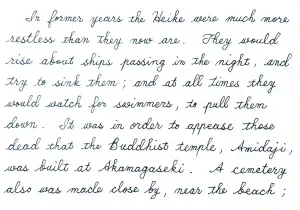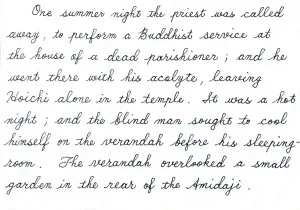琵琶法師『#3怪談_耳なし芳一』対訳
あらすじ
赤間関にホウイチという名前の琵琶法師が住んでいた。ホウイチの歌と演奏は素晴らしいものだったので、阿弥陀寺の歌好きなお坊さんの目に留まった。お坊さんはお寺にホウイチを住まわせて、宿代代わりに、夜に演奏を楽しんだ。
KWAIDAN
THE STORY OF MIMI-NASHI-HOICHI 日本語訳
subject/predicate
Some centuries ago there lived at Akamagaséki a blind man named Hōïchi, who was famed for his skill in recitation and in playing upon the biwa.
KWAIDAN by Lafcadio Hearn
何百年か前に、赤間関にホウイチという盲目の人が住んでいた。彼は朗読や琵琶の奏者として有名だった。
From childhood he had been trained to recite and to play; and while yet a lad he had surpassed his teachers.
KWAIDAN by Lafcadio Hearn
幼いころから、ホウイチは暗唱と演奏の訓練を受けていた。そしてまだ若いにもかかわらず、彼は師匠よりも上手だった。
As a professional biwa-hōshi he became famous chiefly by his recitations of the history of the Heiké and the Genji; and it is said that when he sang the song of the battle of Dan-no-ura “even the goblins [kijin] could not refrain from tears.”
KWAIDAN by Lafcadio Hearn
琵琶法師のプロとして、平家と源氏の物語を朗読して、ホウイチは有名になった。
彼が壇ノ浦の戦いを歌うと、「鬼人でさえも涙を我慢できなかった」そうだ。
At the outset of his career, Hōïchi was very poor; but he found a good friend to help him.
KWAIDAN by Lafcadio Hearn
ホウイチは当初とても貧しかったが、助けてくれる支援者がいた。
The priest of the Amidaji was fond of poetry and music; and he often invited Hōïchi to the temple, to play and recite.
KWAIDAN by Lafcadio Hearn
阿弥陀寺のお坊さんは詩と音楽が大好きだった。彼はたびたびホウイチをお寺に招き、演奏を楽しんだ。
Afterwards, being much impressed by the wonderful skill of the lad, the priest proposed that Hōïchi should make the temple his home; and this offer was gratefully accepted.
KWAIDAN by Lafcadio Hearn
演奏後、ホウイチの妙技にいたく感動して、そのお坊さんは阿弥陀寺に住まないかとホウイチに提案した。そしてこの提案は快く承諾された。
Hōïchi was given a room in the temple-building; and, in return for food and lodging, he was required only to gratify the priest with a musical performance on certain evenings, when otherwise disengaged.
KWAIDAN by Lafcadio Hearn
ホウイチは阿弥陀寺の中に一室与えられた。食事と宿代の代わりは、毎晩の演奏でお坊さんを楽しませることだけでよかった。そしてその時、他のお勤めは止まっていた。
Reference : Kwaidan by Lafcadio Hearn(project gutenberg)
English – Japanese parallel text, handwriting-based foreign language learning


